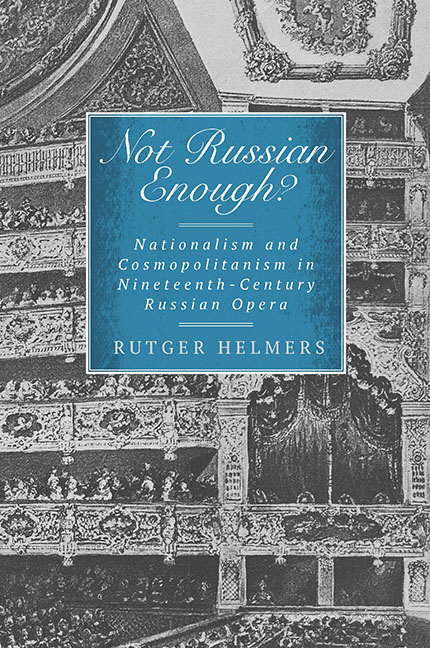Book contents
- Frontmatter
- Dedication
- Contents
- List of Illustrations
- Acknowledgments
- Editorial Notes
- Introduction: The Part and the Whole
- A Life for the Tsar and Bel Canto Opera
- Subject Matter, Local Color, and National Style in Judith
- French Theatricality and Inadvertent Russianisms in The Maid of Orléans
- The Tsar's Bride and the Dilemma of History
- Conclusion
- Abbreviations
- Notes
- Bibliography
- Index
Introduction: The Part and the Whole
Published online by Cambridge University Press: 15 March 2018
- Frontmatter
- Dedication
- Contents
- List of Illustrations
- Acknowledgments
- Editorial Notes
- Introduction: The Part and the Whole
- A Life for the Tsar and Bel Canto Opera
- Subject Matter, Local Color, and National Style in Judith
- French Theatricality and Inadvertent Russianisms in The Maid of Orléans
- The Tsar's Bride and the Dilemma of History
- Conclusion
- Abbreviations
- Notes
- Bibliography
- Index
Summary
Why does the term “Russian music” imply something more special than just music that happens to have been composed in Russia and by Russians, and is simply part and parcel of the music throughout the world at large? The reply is that Russian music, and especially the best nineteenth-century Russian music, has strongly marked national features which do make it something special and apart.
—Michel-Dimitri Calvocoressi, 1944Russian music has long been considered something special. The words of the critic and musicologist Michel-Dimitri Calvocoressi quoted above reflect this belief, widespread among audiences, musicians, critics and scholars alike—a belief that has been eagerly stimulated and exploited in the marketing of this music outside Russia and continues to contribute to its appeal to Western audiences to this day.
It is a belief partly founded on historical reality. The nineteenth century was the century of nationalism, and Russian musicians were among the many who, encouraged by national thought, were searching for ways to distinguish themselves from the internationally dominant styles of German, French, and Italian music. They did so with remarkable success: a number of nineteenthcentury Russian composers have acquired considerable international fame with pieces that competent listeners all over the world will confidently point out as “Russian.”
Still, the attitude so neatly encapsulated in catechetical fashion by Calvocoressi gives rise to some serious problems. If “Russian music” refers to something other than just music composed in Russia or by Russians, what about the music composed in Russia by Russians that does not exhibit “strongly marked national features” and therefore does not belong to this “special and apart” group? It has been a very common response either to ignore or to downplay the significance of this music, even to denounce it.
Such a treatment of Russian music, which privileges difference over similarity and emphasizes uniqueness rather than putting it into perspective, is part of a long and rich history.1 It is an example of what cultural and literary historian Joep Leerssen has described as national particularism or, more broadly, as cultural essentialism: the tendency to see the character or individuality of nations, or any other group, particularly “in those aspects in which they differ most from others.”
- Type
- Chapter
- Information
- Not Russian Enough?Nationalism and Cosmopolitanism in Nineteenth-Century Russian Opera, pp. 1 - 19Publisher: Boydell & BrewerPrint publication year: 2014

